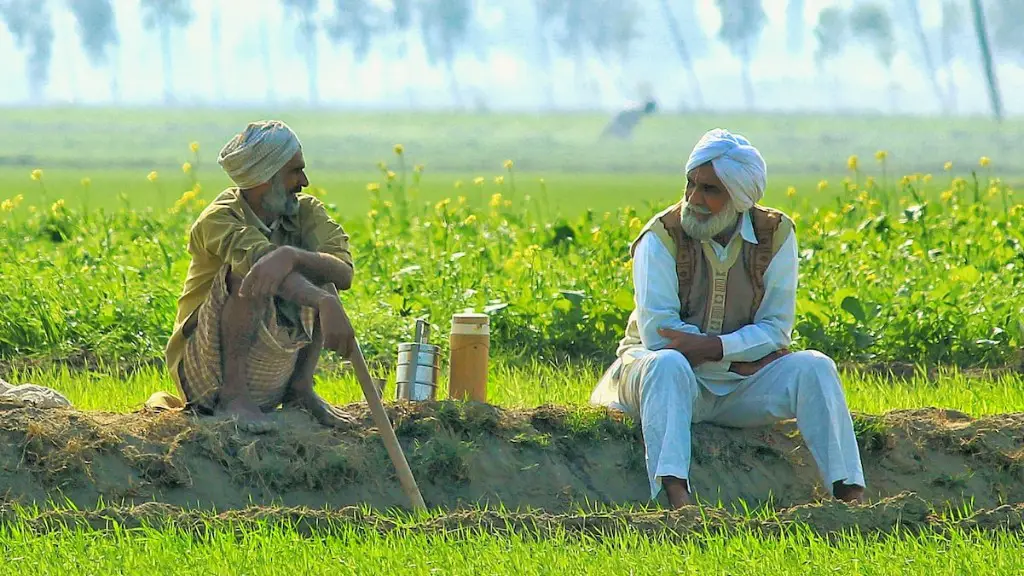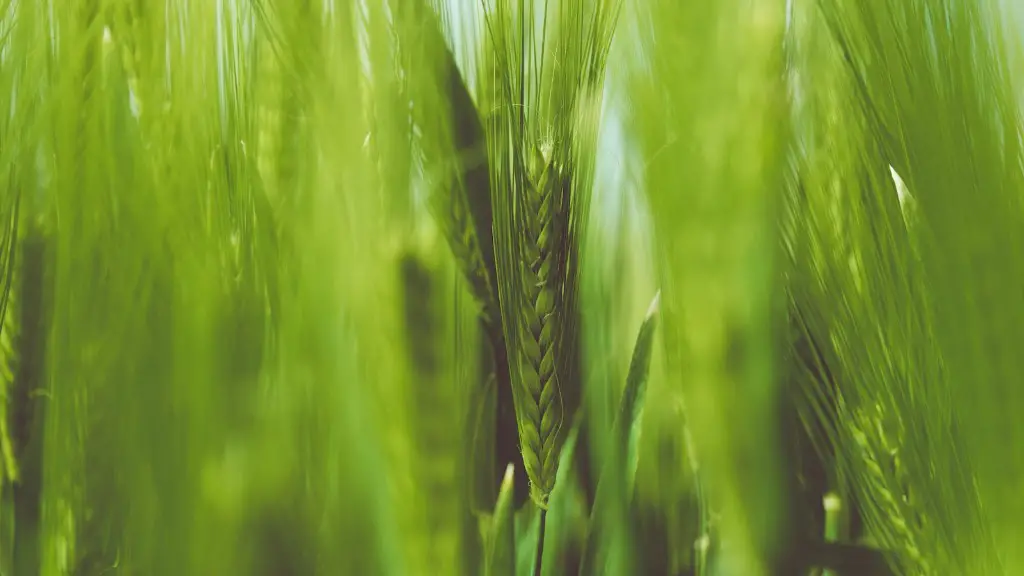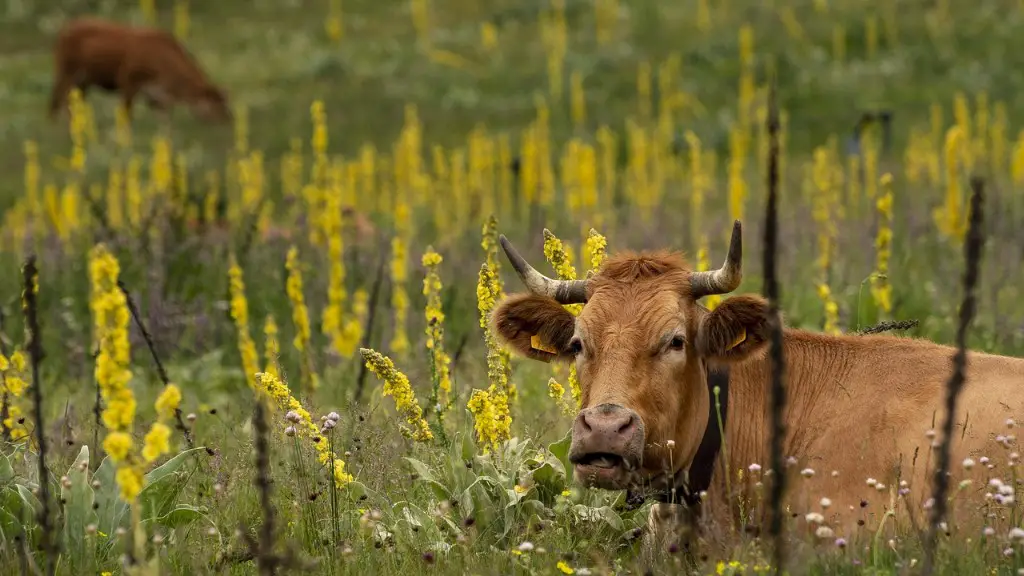If agriculture never existed, the world we know would look drastically different. To understand this, let’s briefly look at the history and importance of agriculture. Early domestication of plants and animals dates back to around 10,000 years ago, with the cultivation of grains, legumes and other crops, and the raising of animals for dairy, meat and other resources. Agriculture has since become a cornerstone of civilization, with over 70% of the world’s population relying on food production for sustenance. So, what would happen if agriculture suddenly never existed?
For starters, the world’s population would be drastically reduced. With no food sources, people would be unable to feed themselves. Additionally, the lack of a food source would mean that entire societies could collapse quickly, leading to famine and other widespread issues. Without agriculture, many of the earth’s complex ecosystems would be thrown into chaos, with entire species likely becoming extinct and struggling to adapt to the new, foodless environment.
The economic impacts of agriculture not existing would also be catastrophic. Farming is the key component of global and domestic economies, with millions of dollars in exports and imports based around agricultural products. This would mean an entire sector of the economy, worth hundreds of billions of dollars, would be suddenly wiped out. Additionally, the diverse range of agricultural jobs created would vanish, further reducing the global workforce.
Furthermore, without agriculture, many of the vital technologies used by modern society would be lost. Many of the advanced irrigation, tilling and seeding techniques used to this day were actually invented in ancient times by farmers. Without the ability to cultivate the crops needed by our society, many of these vital technologies would eventually become obsolete.
Ultimately, it’s difficult to say what would happen if agriculture never existed. What we can say is that the world would be drastically different, with a much smaller population, a battered economy and far fewer technologies available to us. In a world without agriculture, it’s likely that socio-economic progress would be set back by hundreds of years.
Impacts On Nature’s Ecosystems
In a world without agriculture, many of the ecosystems that we rely on would be thrown into chaos. For example, the destruction of crop fields would lead to the erosion of soil, with chaos and devastation befalling the flora and fauna reliant on the land for resources. On top of that, the invaluable habitats created by farms, such as wetlands and ponds, would also be lost, as many of our natural ecosystems rely on the steady flow of food from agriculture.
Additionally, without agriculture, many of the world’s animal species would be under threat. Without the food produced by farming, many species would struggle to find resources, with those which depend heavily on agriculture for food, such as cows and sheep, becoming extinct. This would create a ripple effect throughout the food chain, with a wide range of species eventually gone.
Finally, the lack of agricultural farming practices would lead to the destruction of essential nature preservation programmes. For example, one of the most successful ways of preserving natural habitats is through well-managed agricultural land, which can be used to grow crops and sustain wildlife. Without agricultural practices, many of these programmes would collapse, leading to less biodiversity and a loss of essential resources.
Environmental Effects
The environmental effects of a world without agriculture would be severe. Without the aid of suppliers and producers, the world’s current environmental issues, such as climate change, water pollution and soil degradation, would only worsen. For example, many of the cutting-edge agricultural technologies used today, such as fertilizers and pesticides, help reduce the amount of pollution and erosion caused by traditional farming.
On top of that, a lack of agriculture would mean that important eco-friendly practices, such as crop rotation, would not exist. This could lead to an unprecedented level of environmental destruction, with land quickly becoming uninhabitable due to overuse and sustained damage.
Moreover, without the resources created by agriculture, many of the organic farming techniques used by farmers today would become extinct. These techniques play a crucial role in keeping our land healthy, and without them, the soil could become quickly depleted of essential nutrients.
Clearly, the effects of agriculture not existing would be far reaching, with many of the eco-friendly practices and technologies used by farmers today becoming extinct. Without agriculture, the environment would become quickly degraded, leading to an array of devastating adverse effects.
Impacts On Global Trade
In a world without agriculture, the global economy would suffer greatly. Without the food production necessary to support the billions of people living on the planet, global trade would decline, as would agricultural exports and imports. This would cause shockwaves throughout the world economy, with workers, financiers and manufacturers alike feeling the pinch.
Furthermore, as the global population shrinks, so too would the pool of available talent and resources. With fewer people available to do jobs, the global economy would suffer, leading to economic contraction and recession. With no agricultural production in place, the current delicate balance between supply and demand of food would be broken, leading to extreme shortages and price hikes.
Additionally, the lack of agricultural production would mean the current agricultural trade and investment networks would be rendered obsolete. This could cause investors, governments and other stakeholders to quickly pull their money out of the agricultural industry, leading to the widespread collapse of companies, businesses, and entire economies.
Ultimately, the economic devastation caused by a lack of agriculture would be significant and far-reaching. As food becomes scarce and the global population facing famine and environmental destruction, it becomes clear that the effects of agriculture not existing would have a disastrous impact on global trade.
Societal Impact
The absence of agriculture would have a dramatic effect on human society. Without the steady supply of food created by farmers, millions of people would die from hunger and malnutrition, and entire societies would be thrown into chaos.
Additionally, without the employment and income opportunities offered by the agricultural industry, millions of people would be forced to look for alternative, often more dangerous forms of work. Furthermore, the diversity of roles available to workers, from scientists to immigration workers, would be greatly reduced.
Moreover, with the global population likely declining, many of our current infrastructure networks, such as roads, railways and power grids, would become unusable due to lack of use. This could lead to a breakdown of communication networks, businesses and governments, further reducing the quality of life.
Finally, without agriculture, many of the vital cultural and social ties formed in farming communities would be lost. Farmers form keystone communities, connecting farmers to their local communities and the global market, providing essential economic stability and social cohesion. Without these communities, many essential connections could be lost.
Without agriculture, the world would be a radically different place. We must recognize the integral role that agriculture plays in our lives, and the crucial importance it has for the survival of our societies.
Changing Consumer Habits
Without the steady supply of food created by agriculture, the average consumer’s habits would be significantly altered. With the lack of food, people would be forced to rely on alternative sources of nutrition, such as foraging and hunting. This could lead to a danger to biodiversity in certain areas, as certain species of flora and fauna may not be able to sustain the increased demand.
Additionally, with the lack of readily available food, the demand for processed and pre-packaged products would likely increase, as people look for easier and more convenient solutions. This could lead to an increase in single-use packaging, as well as a rapid increase in the demand for plant-based alternatives, such as soy and lentils, which would be more easily available without the need for agricultural production.
Moreover, without the current agricultural practice of providing food to regions in need, millions of people around the world facing famine would be left without a steady source of nutrition. This could lead to an increase in international migration, as people search for regions with available food resources.
Ultimately, a world without agriculture would force people around the globe to make drastic changes to their lifestyle. With fewer resources available, many everyday habits and practices, such as leisurely dinners and health snacking, would become a luxury instead of a necessity.
Ethical Questions
In a world without agriculture, many key ethical questions would emerge, including questions such as who is responsible for producing food and who has the right to access it. Without a steady food production system in place, many of the ethical frameworks and laws that exist today would become obsolete.
On top of that, without a dependable food source, the question of where food should come from and how it should be administered would become increasingly difficult to answer. With countries and continents vying for resources, the question of food security and access would become more complex, leading to potential ethical issues such as food hoarding and price gouging.
Furthermore, without a food production system in place, the current ethical systems in place to protect the environment, such as organic farming, would no longer be necessary. This could lead to an increase in the use of pesticides, fertilizers and other chemicals, with devastating environmental impacts.
Finally, without the resources provided by agriculture, questions such as who will be responsible for feeding the world would need to be answered. Farming is essential to providing nutrition to the world’s population, and with it gone, how would countries, cities and even individual farmers decide who should be entitled to food?
Clearly, in a world without agriculture, many complex ethical questions would need to be answered. Without effective ethical frameworks in place to manage the production and distribution of food, the world could be facing a devastating shortage of resources.





